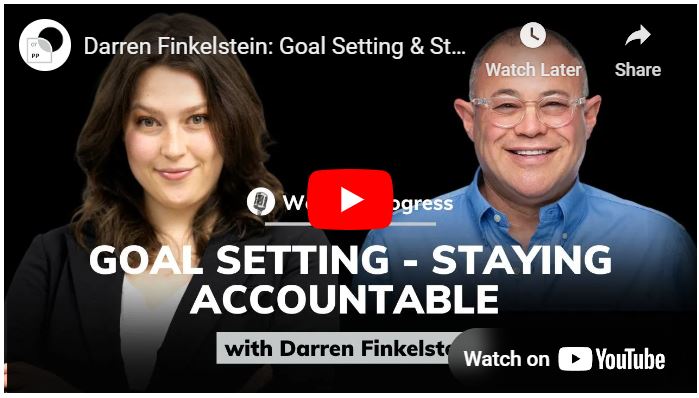Accountability coaching has gained significant attention as a powerful tool for personal and professional growth. It focuses on improving one’s ability to set and achieve goals effectively by fostering a sense of responsibility and commitment. In today’s ever-shifting world, where personal and work lives often intersect, staying accountable can be challenging. That’s where accountability coaching steps in. It acts as a support system to help individuals navigate their responsibilities more efficiently, aligning their actions with their aspirations.
Yet, the road to becoming accountable isn’t always smooth. Individuals often encounter specific hurdles in their journey towards greater responsibility. These challenges can hinder progress and prevent people from achieving their full potential. Let’s explore some of the common obstacles faced by clients in accountability coaching.

Discover your Accountability Score and increase the probability of smashing your GOALS and Getting Sh!t Done!
Understanding Accountability Coaching
What exactly is accountability coaching? At its core, accountability coaching is about helping individuals commit to their personal and professional goals. The coach provides guidance and support, ensuring that the client remains focused and motivated throughout the process. The primary aim is to foster a mindset that aligns actions with desired outcomes, creating a pathway to success.
Accountability coaching holds substantial value. It empowers individuals to make informed decisions, cultivate discipline, and build resilience. By identifying strengths and weaknesses, coaching helps tailor strategies that drive clients towards their aspirations. Whether tackling daily tasks or long-term objectives, accountability coaching serves as a steady anchor.
Common Challenges Faced by Accountability Coaching Clients
Navigating accountability often presents its set of challenges. While the journey is rewarding, clients frequently encounter hurdles that need understanding and strategic handling:
– Procrastination Issues:
Delaying tasks can derail progress. Procrastination is a common obstacle, as delaying tasks often seems more manageable than confronting them directly. Identifying procrastination is the first step. Breaking tasks into smaller, manageable units can help keep momentum going and reduce the overwhelm.
– Lack of Clear Goals:
Vague aspirations lead to confusion, making it difficult to measure progress. It’s crucial to define clear, actionable goals. By establishing specific targets, the path becomes clearer, and success becomes more attainable.
– Fear of Accountability:
The notion of being held accountable can be daunting for some. This fear may stem from a lack of confidence or the pressure to meet expectations. A supportive coaching environment can ease this fear, transforming apprehension into empowerment.
– Resistance to Change:
Change often brings discomfort, leading to resistance. Addressing these issues requires a positive mindset and gradual adjustments. Emphasising the benefits of change and setting realistic timelines can help individuals adapt smoothly.
– Maintaining Consistency:
Staying true to commitments requires effort and perseverance. It involves creating routines and staying focused even when motivation wanes. Consistency is built through practice and persistence, and coaching provides the necessary support to uphold it.
By understanding these challenges, individuals can devise effective strategies to conquer them. The aim is to transform obstacles into opportunities, paving the way for personal accountability and growth.
Strategies to Overcome These Challenges
Overcoming challenges in accountability coaching doesn’t happen overnight, but with the right strategies, individuals can make significant progress. Setting realistic goals is a critical step. It’s about defining objectives that are attainable and timebound so they don’t overwhelm or discourage. By breaking down larger goals into smaller, actionable steps, individuals can move towards their main objectives with less anxiety and more focus.
Next, creating effective accountability systems can make a difference. Such systems might include digital tools or traditional planners to track progress and deadlines. By having a visual representation of what needs to be done, it becomes easier to maintain focus.
Communication is another key element. Open and honest dialogue between a coach and client paves the way for trust and mutual understanding. This relationship ensures that concerns are addressed promptly and that the client feels supported throughout their journey.
Regular check-ins provide an opportunity to assess what’s working and what isn’t. It’s important to reflect on achievements and setbacks to adapt the approach where necessary. Having these scheduled meetings helps clients stay aligned with their goals and the strategies needed to reach them.
Lastly, never underestimate the power of positive reinforcement. Celebrating successes, no matter how small, can boost morale and motivate further progress. It encourages clients to keep pushing, and it reinforces the value of the process.
Path to Successful Accountability
Embracing accountability coaching involves understanding and overcoming diverse challenges. By focusing on setting realistic goals and establishing accountability systems, individuals can enhance their journey. Open communication and regular assessments help in staying on track, while positive reinforcement ensures a good balance of motivation and achievement.
Strategies outlined play a crucial role in turning obstacles into stepping stones. They help clients develop the skills needed to stick to commitments over time, fostering a more accountable lifestyle. Creating a structured environment where goals are visible and progress is measurable brings clarity and consistency, setting the stage for success.
Tick Those Boxes specialises in helping individuals and organisations become more accountable. Contact our team to see how our programs may help you establish a more effective and accountable workplace, allowing you to do the things you say you will do, and getting your teams to do the same.
Need support in transforming your goals into actionable steps? Work with me—an experienced accountability coach working with individuals and organisations all over the world—and start building the discipline you need. Tick Those Boxes offers programs that help you align your actions with your aspirations, supporting both individual and organisational growth.


